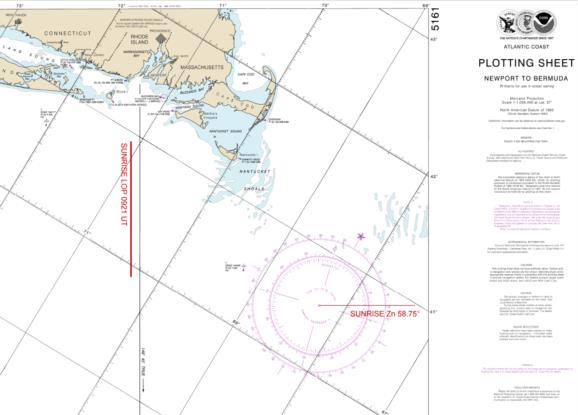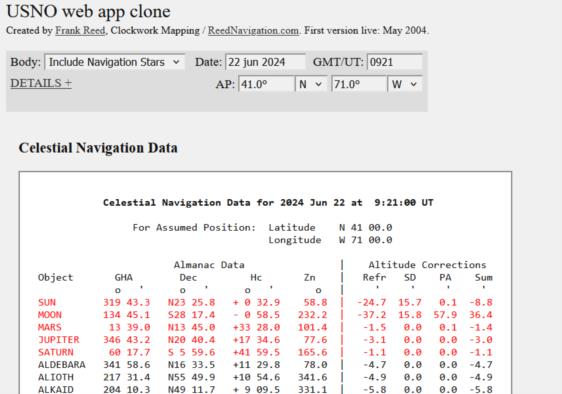
NavList:
A Community Devoted to the Preservation and Practice of Celestial Navigation and Other Methods of Traditional Wayfinding
From: Frank Reed
Date: 2024 Apr 24, 18:57 -0700
The Newport-Bermuda Race this year starts on Friday, June 21. Lots of sunlight that day, every year... It's the solstice. Maybe unfortunately, lots of moonlight, too, this year. I'm calling it unfortunate because sailing to Bermuda can be a great opportunity to see the spectacular star clouds of the Milky Way from Cassiopeia through Cygnus down to Sagittarius and Scorpius. Spectacular! ...except when the Moon is Full, as it is on June 21, 2024. On the other hand, if anyone is doing celestial, the Moon may provide horizons later in twilight and even deep into the middle of the night. In the Newport-Bermuda Race, celestial would be "just for fun". There's no handicap, no advantage from applying celestial skills, as there is in other ocean races. But some will sail by celestial navigation anyway... for the pleasure and the challenge.
There's a special Sun sight that's worth a try on this race and on any sail on this route, coming or going, at this time of year. The Sun rises on an azimuth that is almost exactly perpendicular to the standard rhumbline from the opening of Narragansett Bay (just outside my window as I write this) to Bermuda. And incidentally, since the distance is not great, and also because the course is relatively close to South, the rhumbline is nearly indistinguishable from the great circle to Bermuda. Thanks to the money behind yacht racing, there's a special NOAA chart displaying the rhumbline for the race. It's on a course of 148°45' (see below). And if you time it right, not long after sunrise the Sun is on a true azimuth of 58°45' ...directly "abeam" or 90° from the standard reference course to Bermuda.
So how would you do this? The observation could be made without a sextant possibly, just timing the event. What would be the best choices for this sight? Could you arrange it so that you could apply nearly identical rules for several days from June 21... maybe all the way to Bermuda? And what are the technical uncertainties, like refraction issues?
What's the advantage of this sight? The LOP generated from it is almost exactly parallel to the rhumbline on the 5161. What can we do with that from the point of view of practical navigation? I've got my own ideas, of course, and I've been advising navigators on this one for quite a few years (including some years before lockdown fun). But maybe I'm not doing it properly... Or maybe there's some better way to use this sighting opportunity...
Frank Reed








